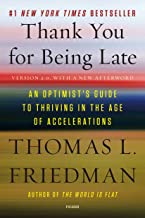 KIRKUS REVIEW
KIRKUS REVIEW
The celebrated New York Times columnist diagnoses this unprecedented historical moment and suggests strategies for “resilience and propulsion” that will help us adapt.
“Are things just getting too damned fast?” Friedman (Hot, Flat, and Crowded: Why We Need a Green Revolution—and How It Can Renew America, 2008, etc.) cites 2007 as the year we reached a technological inflection point. Combined with increasingly fast-paced globalization (financial goods and services, information, ideas, innovation) and the subsequent speedy shocks to our planet’s natural system (climate change, biodiversity loss, deforestation, geochemical flows), we’ve entered an “age of accelerations” that promises to transform “almost every aspect of modern life.” The three-time Pulitzer winner puts his familiar methodology—extensive travel, thorough reporting, interviews with the high-placed movers and shakers, conversations with the lowly moved and shaken—to especially good use here, beginning with a wonderfully Friedman-esque encounter with a parking attendant during which he explains the philosophy and technique underlying his columns and books. The author closes with a return to his Minnesota hometown to reconnect with and explore some effective habits of democratic citizenship. In between, he discusses topics as varied as how garbage cans got smart, how the exponential growth in computational power has resulted in a “supernova” of creative energy, how the computer Watson won Jeopardy, and how, without owning a single property, Airbnb rents out more rooms than all the major hotel chains combined. To meet these and other dizzying accelerations, Friedman advises developing a “dynamic stability,” and he prescribes nothing less than a redesign of our workplaces, politics, geopolitics, ethics, and communities. Drawing lessons from Mother Nature about adaptability, sustainability, and interdependence, he never underestimates the challenges ahead. However, he’s optimistic about our chances as he seeks out these strategies in action, ranging from how AT&T trains its workers to how Tunisia survived the Arab Spring to how chickens can alleviate African poverty.
Required reading for a generation that’s “going to be asked to dance in a hurricane.”
